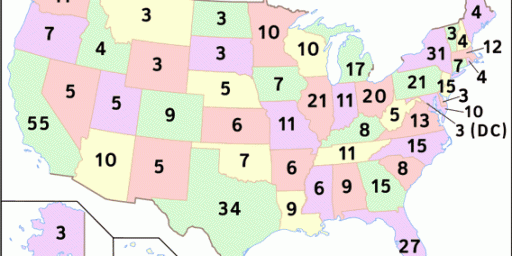Blatant Unconstitutionality in the Shadow of Framers
 For a whole variety of reasons, I’m a strong believer in the adherence to the plain meaning of the U.S. Constitution and believe that it should be amended rather than circumvented when the realities of today conflict with those of 1789. Still, there are those who make a fetish of the wisdom of the Framers when, as Eugene Volokh notes, “blatant unconstitutionality started early.”
For a whole variety of reasons, I’m a strong believer in the adherence to the plain meaning of the U.S. Constitution and believe that it should be amended rather than circumvented when the realities of today conflict with those of 1789. Still, there are those who make a fetish of the wisdom of the Framers when, as Eugene Volokh notes, “blatant unconstitutionality started early.”
He cites a specific, fairly innocuous passage:
1789: The states ratify the U.S. Constitution, which says, in relevant part, that “No Person shall be a Representative who shall not have attained to the Age of twenty five Years.”
1797: William C.C. Claiborne is seated as a Representative from Tennessee, at age 22.
I’d love to know more about whether any constitutional objections were raised to this; Joseph T. Hatfield, William Claiborne: Jeffersonian Centurion in the American Southwest (1976), doesn’t discuss any controversy about this, and a research assistant whom I asked to look through the Knoxville Gazette for 1796 to 1798 didn’t find any articles mentioning any controversy about this.
Henry Clay was sworn in as U.S. Senator on Dec. 29, 1806, when he was three and a half months short of the constitutionally required age of thirty. I couldn’t find any evidence that there was any controversy about that, either. On the other hand, Albert Gallatin was denied a Senate seat in 1793 on the grounds that he hadn’t satisfied the constitutional requirement of having “been nine Years a Citizen of the United States.”
Particularly amusing in light of the continued frothing at the mouth over Barack Obama’s birth certificate.
Of course, the age requirement is among the least significant examples — although one of which I was unaware — of the Constitution being treated as a mere political inconvenience while the men who wrote it were not only alive but still active in politics. Remember, James Madison, widely considered the Father of the Constitution, was president from 1809 to 1817 — well after these incidents. Either George Washington or John Adams, both prominent Framers, were president when Claiborne was seated and Thomas Jefferson was in office when Clay was seated.
Regardless, Washington vastly expanded on the enumerated powers of the presidency — creating the doctrine of Implied Powers — and Jefferson, the leader of the minimalist camp during the Constitutional debates and long thereafter, boldly ignored the document when making the Louisiana Purchase.






The writers of the Constitution argued about its meaning not long after the ink was dry. The plain meaning is often not clear. Besides, it was clearly meant as a framework since it could not cover every future contingency. We are doomed to debate forever what it means as cannot ask the writers, and even if we did we would get different answers depending upon whom we asked. Maybe Jefferson was right and it should have been redone every so often.
Steve
No doubt.
Sure, but that’s also why it’s short and broad. But the federal government is now doing all manner of things that are wildly out of kilter with their Constitutional power. Many of them, they really should in fact be doing given how much the world has changed. I just think we ought to do it in conformance with the law, not through legal fictions pretending otherwise.
Yeah, and the tea wasn’t even completely dry from that party up in Boston. Sheesh.
So, what’s the point? That “constitutionality” is no longer relevant as a doctrine? Or that it is all about power, i.e., what you can get away with?
I would guess that the issue was never raised and the reason it was never raised is that nobody knew his age. It’s a basic premise of parliamentary procedure that the issue of a broken rule must be raised by point of order.
“Particularly amusing in light of the continued frothing at the mouth over Barack Obama’s birth certificate.”
“”””””””””””””””””””””””””””””
It appears,the “frothing” is coming from the B.O. defenders, the attempt to discredit the so called “birthers”, instead of their argument being the only response… ever.
This is on par with those who here defended infidelity when their demigod is suspected, instead of seeking the truth before judgment.
Tell that to Alexander Hamilton. He’d still think we’re frustratingly holding on to a pre-Constitution vision of state sovereignty.
I think part of the point is that those most close to the origination of the Constitution seem to have had a somewhat looser understanding of “what it all meant” than we have. There is no plainer language in the (amended) Constitution, than the words of the First Amendment, “Congress shall make no law … abridging the freedom of speech, or of the press” and yet Congress saw fit to pass the Alien and Sedition Acts.
Yup. Part of the problem with Constitutional interpretation is that the Framers were — brace yourselves — politicians and the document itself was — shudders — a work of compromise.
Still, it’s hard to see the pre-12th Amendment Senate, the 9th Amendment, and the original version of the Electoral College as other than nods to state sovereignty. Or, indeed, the fact that they were called “States.”
No borders, disparate treatment under the law, [based on race, gender or ethnicity], imminent domain for private parties, confiscation of private property without due process, expectation of privacy reserved only for Abortion seekers,[but not other medical records]…..
Folks, we have blatantly and commonly sacrificed the Constitution and the Bill of Rights, on the alter of expediency.
Should this be a “wake-up call” or a call for expanded perversion?
One note on Where is Obama’s Birth Certificate: AFAIK there is a process to raise any objection to the ballot before the ballots are produced and distributed. (Remember the dreaded butterfly ballot?) I haven’t read enough of the court filings, but I can’t see how any objection at this time can be timely, even if someone produces incontrovertible evidence that Obama was born in the Dutchy of Grand Fenwick.
Same with Mr. Claiborne. Unless Claiborne’s age was made an issue at the time, it doesn’t tell us anything about anybody’s regard for the Constitution, except perhaps Mr. Claiborne.
sam, I’m sorry I think the Alien & Sedition Acts were entirely consistent with the interpretation of the First Amendment when it was drafted. See Prior Restraint Rather, I think it is an example of a provision which originally held the crabbed, legalistic view of English barristers and was transformed through the popular democracy.
.
A proper response would require really getting into the constitutional/historical weeds (e.g., Jefferson’s take), but if your interpretation is correct, that would just underscore my point, no? That “back then” a lot of folks, maybe most, had a different understanding of the constitution (on some core issues) than we do, regardless of political persuasion. Of course, this would require those who cleave to the “there ain’t no living constitution” church some heartburn, I’d think.
Joyner,
True, they were “politicians”, but hardly in the modern sense. Also, several of those fellas could have held multiple doctorates by today’s standards, so I’m more inclined to trust their judgment, philosophically speaking, than the clowns that populate Congress today. I broadly agree with what you’re saying here, just felt like picking those particular nits.
sam, with all due respect the problem with the doctrine of the “living constitution” isn’t what you described but that the intent of the past will always be judged through a prism of the mores of today and that any and all sense of objectivity will be tossed aside in favor of today’s temporal subjectivity. Justice becomes real hard for us simple folk when the rules of the game can change by fiat, not due to changes in statutes but merely to changes in their postmodern interpretation. But even amongst us “dead constitutionalists,” a textualist versus an intentionalist interpretation of the constitution is another discussion for another day.
As was argued in more than one of the Federalist Papers. The fact is, as they claimed, the Federal government will do (and should do) what is necessary to meet it’s responsibilities, whether or not those necessary powers have been granted it.
Therefore, they chose to grant the Federal government broader powers, because they knew that forcing them to use unconstitutional powers when necessary, would only encourage the use of unconstitutional powers when unnecessary.
That is why I believe that Madison, and certainly Hamilton (much more the nationalist, as Alex pointed out), would have been okay with the mandate for individual insurance, as experts on both sides agree that it is a necessary power to ensure affordable health care is available to all.
I can’t find the “ensure affordable health care for all” clause in the US Constitution, the Declaration of Independence, or in any of the other founding documents. Can you provide a reference?
charles,
Not every thing the Federal government is every going to need to do has been outlined in the US Constitution. They recognized this fact as they were writing it.
I would quote the relevant passages from the Federalist Papers, but it’s sitting on my bedside table at home at the moment.